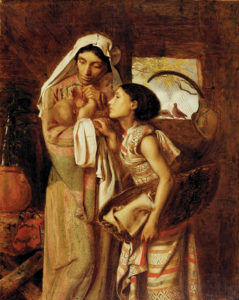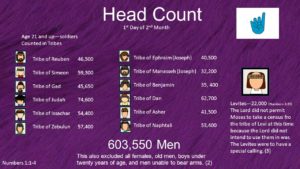We begin with big mazel tov wishes to our dear friends Aliza and Shlomie Liechtung upon the engagement, earlier this week, of their beautiful daughter Miki, to Jon Herskowitz, the son of Daphne and Neil Herskowitz . Mazel tov wishes to the entire extended Liechtung, Schachter and Herskowitz families. Details to follow.
Raboyseyee and Ladies:
The Liviyim: The Few & The Exalted
Shoin, with the very joyous and easy to observe Yom Tov of Shovuis having fallen on Wednesday and Thursday of this week, the heylige Oisvorfer had precious little time to prepare a parsha review and was seriously considering recycling one of the six previous reviews written on Parshas Nosi which can all be found at www.oisvorfer.com.
Ober this past shabbis as I was listening to a shtikel review on parshas Bamidbar which describes in great detail the census the RBSO ordered of His people, I was taken aback by the relatively small number of Liviyim, and especially so when compared to the numbers of the other shevotim. As a Levi (a Levite, one born into the tribe of Levi, he the third son of Yaakov), the low birthrate among the Liviyim was perplexing. Why were they lagging? Did the Liviyim suffer from low sperm count? Were they efsher not as sexually active? Why they being punished? And taka how many were there? And what about in our more modern times? Are the Liviyim still fewer in number? Indeed they are: seemingly, the number of Liviyim, even in our times, remains amazingly low when compared to what we call ‘yisroeylim’ and taka, it’s good to be a Levi. Liviyim remain scarce, and when joining most (big) shuls where aliyas are in general scarce, it’s avada good to be a Levi.
 Let’s recall that just last week (parshas Bamidbar) the RBSO ordered that all males between the ages of 20 and 50 be counted. All shevotim with the exception of those born to Sheyvet Levi. The Levites were to have their own census. The heylige Toirah (last week) gave us the following numbers for male Yiddin between the ages of 20 and 50 in each sheyvet.
Let’s recall that just last week (parshas Bamidbar) the RBSO ordered that all males between the ages of 20 and 50 be counted. All shevotim with the exception of those born to Sheyvet Levi. The Levites were to have their own census. The heylige Toirah (last week) gave us the following numbers for male Yiddin between the ages of 20 and 50 in each sheyvet.
Reuvain: 46,500
Shimon: 59,300
Gad: 45,650
Yehudah: 74,600
Yisochor: 57,400
Zivulin: 57,400
Ephraim: 40,500
Minashe: 32,200
Binyomin: 35,400
Don: 62,700
Osher: 41,500
Naftoli: 53,400
TOTAL 603,500
Exactly how each sheyvet’s males between 20 and 50 all rounded out to even numbers, ver veyst. Now, if you recall, the RBSO instructed Moishe to count the Leviyim separately. They were to be counted from the age of one month. When counted, their number came to 22,300. That’s it? How was it shayich that all the other shivotim, even when counted from age 20, had such significant numbers, yet those being born into the tribe of Levi (seemingly the only prerequisite to being considered a Levi) and who were counted as of one month old, came to but a paltry 22,300? And what has all this to do with this week’s parsha of Nosi?
Nu, as it turns out, the very word Nosi refers to the continuing count of the Liviyim who, despite their low census numbers, were counted not once, but twice. And as Nosi opens, Moishe and his assistants are again counting the Liviyim, this time to get a number of those eligible and ready to serve. Serve where? The Liviyim did not see active military duty: they were assigned to Mishkan related duties only. Later, once the Beis Hamikdash was built, their duties also included assisting the Koihanim with their avoido (service), as well as playing instruments and singing. More on that in a moment. Ober, why taka were there so few Liviyim? Lest you think the Oisvorfer was the only bothered by their low census count, or even the first to ponder this question, he was not. Efsher he is the last, aside from his readers who never gave this inyan much thought. Ober, why taka were there so few of them? Nu, believe it or not, many pontificated over this issue and let’s see what some had to say.
 Says the Tzror Hamor azoy: it’s efsher taka sex related: perhaps they weren’t as active as the others. Ok, he doesn’t say exactly that, but he does say this: The Liviyim were the spiritual leaders of the Yiddin, with such leadership harkening back to the days of slavery back in Mitzrayim. Over in Goishen where they lived they were the rebbes and teachers. What they taught, ver veyst? Avada you recall -and so says the medrish (Medrish Rabbah)- that neither Moishe, nor Aharoin nor the other Liviyim were enslaved. They Liviyim did not perform any physical labor while in Mitzrayim. What were they doing? They were immersed in spiritual matters. What matters? Ver veyst. According to this pshat, they were constantly immersed in their Toirah studies. So? Don’t we all know many who are immersed in Toirah studies, and yet manage to have very large families? Is Toirah immersion an impediment to having a large family? Are these concepts mutually exclusive? Have you ever been to Lakewood? To B’nei B’rak? Well, according to this pshat the answer is yes: their spiritual immersion weakened them physically. Does learning the heylige Toirah (not yet in written form back then) weaken the body? Maybe it does: and taka, so says the heylige Gemora (Sanhedrin 26B). It does? Yes! Says the Gemora: “Toirah mitoishes koichoi shel odom” (the heylige Toirah, or the study of Toirah saps the strength of man). There are at least two additional references in the heylige Gemora which confirm that learning Toirah can physically weaken the body. And efsher that’s taka the idea: a person with a weakened body will not have the strength to go about chapping where he shouldn’t be, if you chap. Nu, with a weakened body, they had no koiach to do the avoido, if you chap, at home. They could not properly service their wives. Hence they were fewer in number.
Says the Tzror Hamor azoy: it’s efsher taka sex related: perhaps they weren’t as active as the others. Ok, he doesn’t say exactly that, but he does say this: The Liviyim were the spiritual leaders of the Yiddin, with such leadership harkening back to the days of slavery back in Mitzrayim. Over in Goishen where they lived they were the rebbes and teachers. What they taught, ver veyst? Avada you recall -and so says the medrish (Medrish Rabbah)- that neither Moishe, nor Aharoin nor the other Liviyim were enslaved. They Liviyim did not perform any physical labor while in Mitzrayim. What were they doing? They were immersed in spiritual matters. What matters? Ver veyst. According to this pshat, they were constantly immersed in their Toirah studies. So? Don’t we all know many who are immersed in Toirah studies, and yet manage to have very large families? Is Toirah immersion an impediment to having a large family? Are these concepts mutually exclusive? Have you ever been to Lakewood? To B’nei B’rak? Well, according to this pshat the answer is yes: their spiritual immersion weakened them physically. Does learning the heylige Toirah (not yet in written form back then) weaken the body? Maybe it does: and taka, so says the heylige Gemora (Sanhedrin 26B). It does? Yes! Says the Gemora: “Toirah mitoishes koichoi shel odom” (the heylige Toirah, or the study of Toirah saps the strength of man). There are at least two additional references in the heylige Gemora which confirm that learning Toirah can physically weaken the body. And efsher that’s taka the idea: a person with a weakened body will not have the strength to go about chapping where he shouldn’t be, if you chap. Nu, with a weakened body, they had no koiach to do the avoido, if you chap, at home. They could not properly service their wives. Hence they were fewer in number.
And Says the RambaN: let’s recall that Yaakov Ovenu, on his deathbed, while surrounded by his holy children, and just before giving them all a general brocho for success, excoriated Shimon and Levi. He was still smarting over their sword games during which they wiped out all of Shechem’s inhabitants including Shechem the rapist. And as a result of Yaakov’s harsh words, Levi’s sperm count was efsher somewhat diminished, and as a result, the Liviyim were fewer in number. Was he efsher cursed? As to why Shimon’s progeny totaled 59,300, more than double of Levi, and was among the highest of all the shevotim, nu, that’s for a different pshat and time. RambaN will tell us that Shimon’s numbers were later diminished as we will learn much later in Bamidbar (26:14).
 Ober says the Oir Hachaim and the Klei Yokor, azoy: it makes perfect sense that the Liviyim were so few in number and it all hearkens back to Amrom and Yoicheved, Moishe’s parents. What did they do or not? Let’s roll back to parshas Shemois. Paroy had just ordered that all baby males be thrown into the river. What did Amrom do in response? Says the heylige Gemora (Soitah 12a) azoy: given the decree, rather than be active with his eishes chayil, and have children, he divorced her. Immediately thereafter, following his lead, all the other Levite husbands divorced their wives. Shoin, all the Liviyiim were divorced: none were having relations with their wives, and shoin, no kids were being born. These Levites were not prepared to evade Paroy’s decree by impregnating their wives, and having them give birth in the fields, out of sight of the Mitzrim. (Seemingly only the Liviyim took such drastic measures while the others remained married, sexually active, while siring many children.) What happened next? Along came Miriam and convinced her father to remarry her mother and shoin. From that union or reunion, along came Moishe. Gishmak. However, not all Levite families had a Miriam to convince their parents to remarry, and shoin, most of the Liviyim remained divorced for many years. Hence their birth rates remained quite low.
Ober says the Oir Hachaim and the Klei Yokor, azoy: it makes perfect sense that the Liviyim were so few in number and it all hearkens back to Amrom and Yoicheved, Moishe’s parents. What did they do or not? Let’s roll back to parshas Shemois. Paroy had just ordered that all baby males be thrown into the river. What did Amrom do in response? Says the heylige Gemora (Soitah 12a) azoy: given the decree, rather than be active with his eishes chayil, and have children, he divorced her. Immediately thereafter, following his lead, all the other Levite husbands divorced their wives. Shoin, all the Liviyiim were divorced: none were having relations with their wives, and shoin, no kids were being born. These Levites were not prepared to evade Paroy’s decree by impregnating their wives, and having them give birth in the fields, out of sight of the Mitzrim. (Seemingly only the Liviyim took such drastic measures while the others remained married, sexually active, while siring many children.) What happened next? Along came Miriam and convinced her father to remarry her mother and shoin. From that union or reunion, along came Moishe. Gishmak. However, not all Levite families had a Miriam to convince their parents to remarry, and shoin, most of the Liviyim remained divorced for many years. Hence their birth rates remained quite low.
The RambaN does offer an alternative theory as to why the Liviyim were so few in number and suggests that pshat could be azoy. Though the Yiddin were taka enslaved and were forced to perform back-breaking labor (as we recount yearly at the Pesach sedorim over at myriad hotels where we re-enact the enslavement with poolside bbq’s, 24 hours tea rooms, night activities, and much more), the RBSO, as He does always, had a master plan. Says the heylige Toirah (Shemois 5:16), azoy: “ka’sher y’anu oisoi, keyn yirbeh” (as they (the Mitzrim) pained and punished the Yiddin, so did they multiply). In other words, the more the Mitzrim subjugated them and made life miserable, the more they somehow multiplied. Let’s avada recall learning that the women of that generation would meet their men in the fields with their mirrors in tow, and entice them to service them. And from that service came many children. In fact the birth explosion was nothing short of miraculous. Rashi and others told us that the birthrate during the enslavement was ‘supernatural.’ Ober what about the Liviyim? Where were their wives? Shoin, let’s recall that the Liviyim were not enslaved, they were not at all subjugated to back breaking labor; therefore the RBSO did not see fit to reward them. Sheyvet Levi’s birthrate was but natural. Their numbers therefore could not keep up when compared to the others.
Wait: there are more opinions and let’s read a few more. Said the Aberbanel: Levi’s small numbers are mistama not related to the frequency of their performances, if you chap. The need for a large population was directly related to a need for people to help conquer and settle the Promised Land. The RBSO wanted to make sure the Yiddin would be safe as they took over large swaths of land. In fact, says the heylige Toirah (Devorim 7:22) azoy: “pen tirbeh o’lecho chayas hasodeh” (lest the wild animals roaming about should harm you). In other words: with more people roaming around, the wild animals would retreat and not harm the conquering Yiddin. Ober since the Liviyim were not destined to inherit their own land, instead relying on the other tribes for smaller swaths of their land, there was no need for them to have large numbers. Therefore, the RBSO allowed them to grow only naturally as opposed to the supernatural growth being experienced by the others.
Along the same lines, says the Meshech Chochmo that the smaller number of Liviyim was by the RBSO’s design. The RBSO had instructed that each sheyvet give over some of its land to house the Liviyim. Had the Liviyim been overly populous, the other tribes might have resented having to give away larger parcels to house them. Let’s explore one more pshat though there are still others to consider.
 Ober says Reb Elchonon Wasserman pshat is like this. The Liviyim were smaller in number by design, that is davka how the RBSO made the world. Everything which is loftier, is rarer. And that’s why there are fewer humans than animals; there are fewer Yiddin than others, and by that same reasoning, given the chashivus (importance) of the Liviyim -they, having been selected to serve the RBSO- there were fewer of them than of other Yiddin.
Ober says Reb Elchonon Wasserman pshat is like this. The Liviyim were smaller in number by design, that is davka how the RBSO made the world. Everything which is loftier, is rarer. And that’s why there are fewer humans than animals; there are fewer Yiddin than others, and by that same reasoning, given the chashivus (importance) of the Liviyim -they, having been selected to serve the RBSO- there were fewer of them than of other Yiddin.
A Rashi we will encounter later in Bamidbar (26:5) will tell us that the Canaanites claimed that the Yiddin were not of pure Jewish stock. What’s pshat? They claimed that since the Mitzrim were ‘masters’ over the Yiddin (they lorded over them), they therefore asserted that it’s also logical that the Mitzrim lorded, in this case meaning chapped, from the Jewish women and got them all pregnant. What to do? How to prove that the Jewish women were not delivering goyishe babies? Nu, the RBSO stepped in and performed yet another miracle. He arranged for supernatural growth among the Yiddin. And what did that prove? Couldn’t the Jewish women have become pregnant and delivered supernatural amounts of kids from the seed of their Mitzri lords? Zicher it would not be the first time that a Jewish woman became pregnant from a goy and mistama not the last. And taka we avada know that although the RBSO knows and sees all, He does allow the world to run naturally. If a Jewish woman has sex with a goy, or is raped, she can indeed become pregnant. The RBSO may not like it but we are taught that He allows the world to run. Grada the heylige Gemora (Avoido Zoro 54b) discusses this topic and wonders why the RBSO would allow women who are raped to become pregnant. The bottom line: though it’s taka emes that a woman can patchke around willingly or unwillingly outside her marriage, and can indeed become pregnant – the RBSO does allow that to happen- ober, the RBSO would not allow such women to experience supernatural growth. The fact they produced at such supernatural rates was proof that these women were pure. The claim of the Canaanites was false.
Let’s close with one more potential answer. If you recall, Levi had three sons, each had his own family. Each family had their own clan. Each was assigned to a particular job: our parsha will tell us that the ‘livany haKihosi (the sons of Kihos) were selected to carry to Aron Koidesh (the Holy Ark), the holiest of the Mishkan’s vessels, whenever the Yiddin traveled throughout the Midbar. Says the medrish so creatively, azoy: Unlike the families of Gershoim and Mirori (Levi’s other two boys), who are referred to as the sons of Gershom and the sons of Mirori, when the heylige Toirah refers to the Kihos clan, it calls them the ‘Livnay ‘Hakihosi’ (the sons of Hakihosi). Why the unique appellation? Why were two letters added to the Kihos name? Says the medrish azoy: their job entailed extreme danger. What could be so dangerous in being assigned to carry the Aron Koidesh? Given their assignment, those carrying the Ark needed to have pure thoughts. Ober, were their minds to stray, and whose doesn’t from time to time, they could be punished with instant death. In other words: one of the reasons suggested for the Levi’s numbers being smaller than the other tribes was because they were constantly dying out for their impure thoughts. Says the medrish: so dangerous was this job, that in order to help them, the RBSO attached two letters of His own name, the letter ‘hey’ at the beginning, and the letter ‘yud’ at the end (changing kihos to Hakihosi) thereby affording them the extra protection they seemingly desperately needed. Avada you know that it when it comes to protection, more is always better, if you chap.
 Wait: there’s more to this medrish and it goes like this: Said Rav Pedat in the name of Rav Yosi ben Zimra (who mistama heard it from someone else, who heard it from yet another source, who mistama made it up), azoy: the extra protection afforded by the addition of the two letters to Kihos, did not always work out in their favor. What happened? As the Aron was being carried from point A to point B, as we will learn throughout Bamidbar, two bolts of lightning shot out from the ends of the poles. Avada you recall the Ark was designed with poles for mobility purposes. These lightning bolts were meant to protect the Yiddin from potential and real enemies who might look to attack them. At times, however, the carriers of the Aron were themselves the victims of the lightning bolts and shoin. Based on this pshat, we can easily chap why the Liviyim were fewer in number; who among us hasn’t had impure thoughts? And who among us hasn’t had crazy impure thoughts, at times, even when davening? Let’s not forget the yetzer horo; he knows no bounds.
Wait: there’s more to this medrish and it goes like this: Said Rav Pedat in the name of Rav Yosi ben Zimra (who mistama heard it from someone else, who heard it from yet another source, who mistama made it up), azoy: the extra protection afforded by the addition of the two letters to Kihos, did not always work out in their favor. What happened? As the Aron was being carried from point A to point B, as we will learn throughout Bamidbar, two bolts of lightning shot out from the ends of the poles. Avada you recall the Ark was designed with poles for mobility purposes. These lightning bolts were meant to protect the Yiddin from potential and real enemies who might look to attack them. At times, however, the carriers of the Aron were themselves the victims of the lightning bolts and shoin. Based on this pshat, we can easily chap why the Liviyim were fewer in number; who among us hasn’t had impure thoughts? And who among us hasn’t had crazy impure thoughts, at times, even when davening? Let’s not forget the yetzer horo; he knows no bounds.
A few things are certain. Ershtens: the Liviyim were certainly fewer in number. Why? Ver veyst? Pick any of the offered explanations that talk to you and veyter gigangin (let’s move on). Tzveytins (secondly), it appears that the RBSO had selected the Liviyim as His personal favorites early on. How early? Let’s recall that both Moishe and his older brother Aharoin were descendants of Levi. And let’s not forget their sister Miriam and the roles she played. Their father Amrom was Levi’s great grandson. Many a medrish has told us that the Liviyim as a group, became exalted only after Moishe returned with the Luchis (Tablets), witnessed the Yiddin dancing around the eygel (golden calf), broke them, and then yelled out “mi LaShem Eylai” (whomever is for the RBSO step over to me). And avada we all know that only the Liviyim stepped forward and stood up when it was time to stand apart and be counted. Perhaps they were born with that certain spirituality gene which was passed on. Moreover, at Moishe’s instructions, they took out swords and carried out the difficult task of having to kill their own brethren, those who participated in the caper. Then again, let’s recall that the Levites were efsher skilled swordsmen having a legacy left behind from Levi himself who, as mentioned above was part of the Shimon and Levi team who used their swords. In the end, the Levites stood apart from the other tribes and it was then that the RBSO decided to swap out the Bichoirim, the firstborns, for the Liviyim for the holy work of carrying the Mishkan and its accouterments while in the Midbar and then being the caretakers and assisting the koihanim when the Beis Hamikdash stood.
A gittin Shabbis!
The Heylige Oisvorfer Ruv
Yitz Grossman

